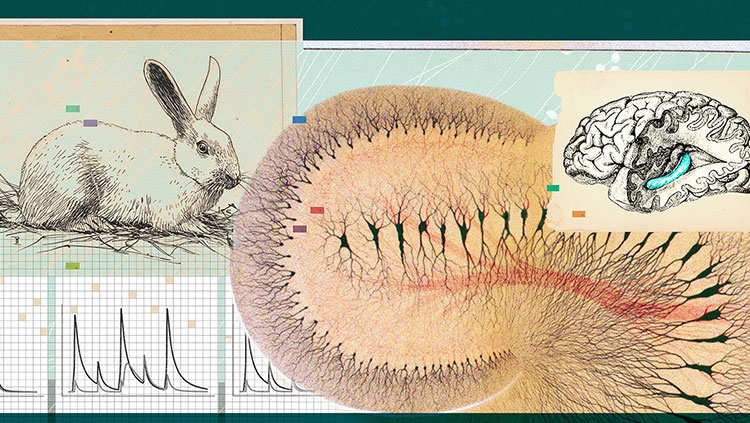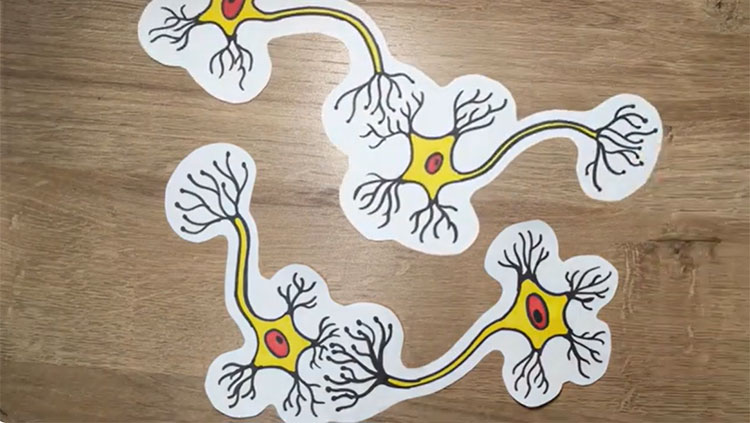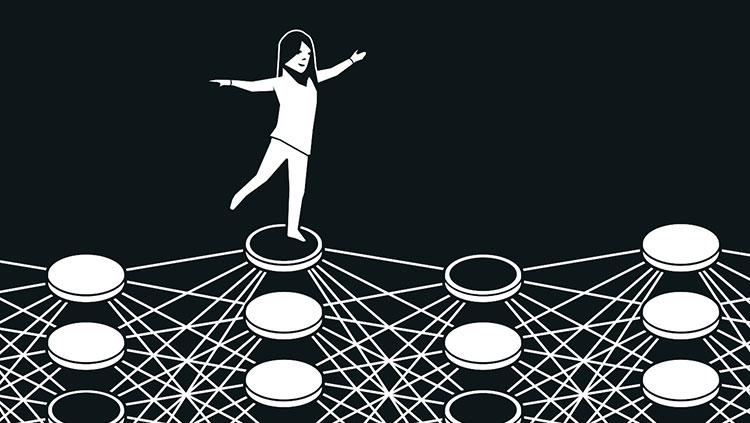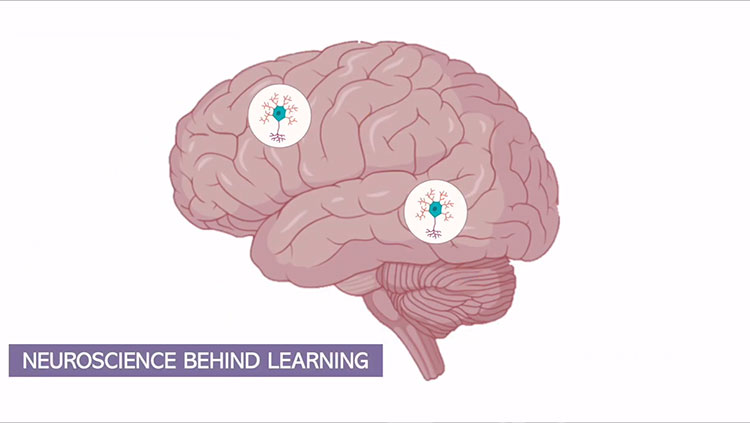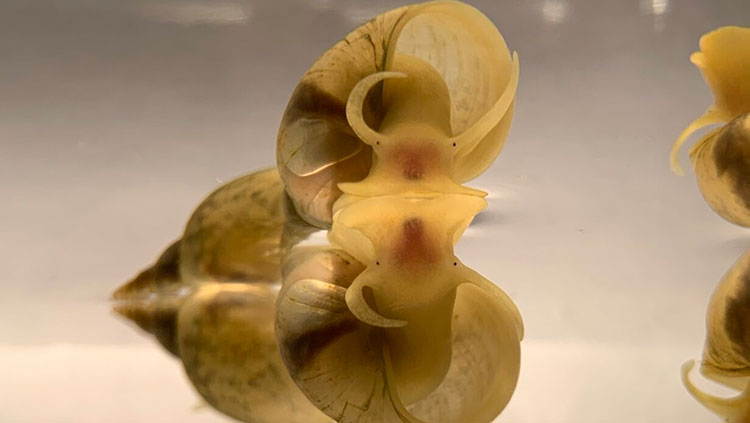The Right State of Mind
- Published7 Mar 2019
- Author Jessica P. Johnson
- Source BrainFacts/SfN
Revisiting the physical environment, emotional, or psychological conditions we first learn a new skill or information helps us recall those memories later in a phenomenon called state-dependent memory.
CONTENT PROVIDED BY
BrainFacts/SfN
Transcript
If you’re used to studying with loud music or with lots of caffeine in your system, you may find that you can remember the information better when you listen to loud music again or drink a huge cup of coffee. That’s because people and other animals, even insects, are better at accessing memories when immersed in the same environment, or emotional or physiological state, as when they learned the information originally. This phenomenon is called state-dependent memory.
I spoke with two scientists who helped me understand how it works.
Almut Hupbach: My name is Almut Hupbach and I’m an associate professor in psychology at Lehigh University.
The idea is that when you store a memory, you store all kinds of surrounding information with the memory. The memory doesn’t exist in isolation. All of these other components are part of the memory. So, when you now try to retrieve it, the more access routes you have, by reinstating your mood or your physiological state, but also environmental cues, like if you’re in the same space or have a photograph or something that triggers that memory, then you’re much better off. I think what you can also take from that is if you really want to have a strong memory that you can access from wherever whenever, you might want to study under very different conditions. That gives you a lot of different access routes to a memory.
Jelena Radulovic: I’m Jelena Radulovic, I’m the Dunbar professor of psychiatry and behavioral sciences at Northwestern University in Chicago.
JR: It’s a very old phenomenon and the interesting thing is that it applies to every type of learning: to motor skills, to simple reflexes, to episodic memories, to semantic memories. So, basically every memory system can function in a state-dependent manner.
BF: Experimental research is full of examples of state-dependent memory in action. Three broad categories of state dependence can help you encode and later access memories. These are your physiological state, your emotional state, and your physical environment. In terms of physiological state, several studies have shown that if you learn a task when you’re drunk, you remember it much better when you’re drunk than sober. The same is true for many other drugs besides alcohol, including morphine, caffeine, Ritalin, and nicotine.
Other studies demonstrate the dependence of memory on our emotional state. Researchers have found that if we’re happy, depressed, afraid, or in some other emotional state when we experience an event, we’re better at recalling that event later when we’re in the same emotional state.
JR: So, in a way, really different brain states allow access to different memories. And typically, if the states are similar as the state that was at encoding, then the degree of similarity really influences very significantly how much we will access.
BF: In addition to physiological and emotional states, your physical environment also shapes memory and learning. So, revisiting the environment in which you first learned something could help you recall it better later. In an experiment conducted in 1975, scientists sent a group of divers underwater and asked them to memorize lists of words. They found that the divers remembered the word lists better when they were again underwater than when they were on dry land.
AH: Your whole brain machinery is equipped to code context, particularly spatial context, with whatever happens in that context. So, the hippocampus is the region that is most responsible for spatial cognition, or spatial coding, and also the major site for episodic memories — memories for events and things that you can place actually in time and space.
BF: Whenever we learn or experience something new, individual neurons in our brains connect to form neural pathways that we can access later when we want to recall the information. If the neural pathway was formed in a particular state or environment, that pathway would function most effectively when we are in the same state.
This doesn’t mean that we won’t remember things at all if we’re not in the same state, nor that we learn or form new memories better in a particular state, just that the closer we are to the original state, the more likely we are to recall something. Because state provides us with a multitude of memory cues.
Now, you might be wondering how it could be useful to remember lists of words underwater, how to play pool only when you’re tipsy, or to access depressive memories when you’re depressed. Likewise, scientists are still trying to understand how state-dependent memory can be beneficial.
AH: Many researchers think that memory is really about predicting the future. It’s not so much about remembering the past. If you are in a certain context, you know what to expect in that context, what could happen. And so, your memory guides you in these predictions.
JR: State-dependent retrieval allows an organism to access information when it’s most beneficial for this organism’s survival.
BF: So, what we learn when we’re in a particular state might help us predict how to handle similar situations in the future. This could help us do things like find food when we’re hungry, perform at the top of our game when we’re under stress, or avoid potentially dangerous situations.
However, state-dependent memory can also produce some major negative side effects. For example, if we experience a traumatic event in a specific environment, later exposure to a similar environment may trigger paralyzing fear or anxiety even when the environment no longer poses a threat. This is called post-traumatic stress disorder, or PTSD.
Similarly, our memories of depressing events can sometimes snowball into a chronic state of depression.
JR: More and more information becomes associated in these negative states. And then suddenly it becomes really difficult to shift. The problem is, with many brain states, the longer they are maintained, the more, in a way, self-preserving they become and the more persistent they become.
BF: But by continuing the push to understand how state influences learning and memory recall, we can gain insight into how to treat conditions like PTSD, depression, anxiety, phobias, and even amnesia and Alzheimer’s disease. Cognitive behavioral therapists have helped people with depression practice imagining positive emotional states to free themselves from the pattern of anticipating negative outcomes. And psychotherapists have made progress in controlled exposure of PTSD patients to triggering environments to retrain the brain to recognize that danger no longer exists. And for Alzheimer’s disease…
JR: Understanding state-dependence would be another way to try to get to memories which cannot be accessed under normal states of consciousness. Even in Alzheimer’s disease, you have sometimes this phenomenon that here and there they somehow do remember. So obviously many memories are still there, but because of the pathology in the brain, maybe the retrieval mechanisms are the ones failing. This could be a matter of access!
AH: In Alzheimer’s, you sometimes try to evoke these old memories from music or photographs and that often is a way to bring actually those patients sort of back to life.
BF: Thanks for listening. Check out more information about how your physical, emotional, and physiological states affect memory at BrainFacts.org.
References
Almut Hupbach, PhD. (n.d.). Retrieved February 7, 2019 from, https://psychology.cas2.lehigh.edu/content/almut-hupbach-0
Goodwin, D. W., Powell, B., Bremer, D., Hoine, H., & Stern, J. (1969). Alcohol and Recall: State-Dependent Effects in Man. Science,163(3873), 1358-1360. doi:10.1126/science.163.3873.1358
Godden, D. R., & Baddeley, A. D. (1975). Context-Dependent Memory In Two Natural Environments: On Land And Underwater. British Journal of Psychology, 66(3), 325-331. doi:10.1111/j.2044-8295.1975.tb01468.x
Jelena Radulovic, MD, PhD. (n.d.). Retrieved February 7, 2019, from https://www.feinberg.northwestern.edu/faculty-profiles/az/profile.html?xid=17328
Also In Learning & Memory
Trending
Popular articles on BrainFacts.org



